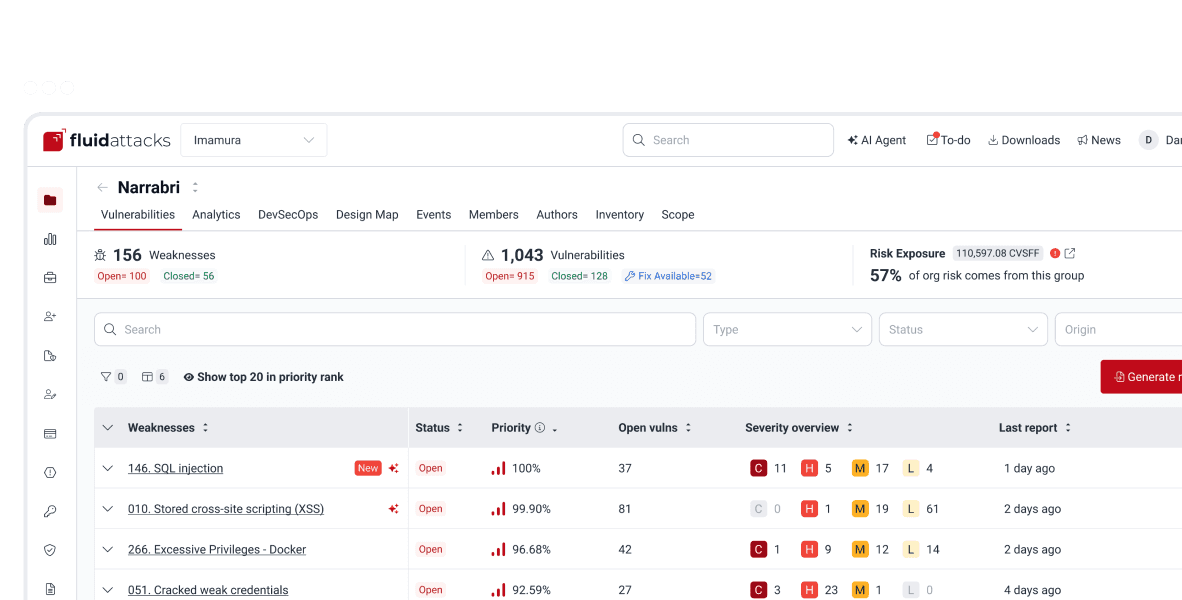Software composition analysis (SCA)
Secure your components and dependencies
Identify vulnerable packages across your project at a glance
Prioritize remediation with EPSS, reachability, and KEV intel
Get safe version recommendations to cut investigation time

Companies already benefiting from Fluid Attacks' SCA
Why your company should choose Fluid Attacks' SCA
Why your company should choose Fluid Attacks' SCA

Testing starts easily and without delays
The setup to start tests with our code scanning tool takes less than 10 minutes, as we use OAuth to access your Git repository stored in GitLab, GitHub, Azure, or Bitbucket.
Detailed inventories of components and dependencies
Quick identification of vulnerable components
Shift left from your IDE with our MCP
Help to prevent supply chain attacks

Testing starts easily and without delays
The setup to start tests with our code scanning tool takes less than 10 minutes, as we use OAuth to access your Git repository stored in GitLab, GitHub, Azure, or Bitbucket.
Detailed inventories of components and dependencies
Quick identification of vulnerable components
Shift left from your IDE with our MCP
Help to prevent supply chain attacks
Supported package managers
Bun (JavaScript)
Bundler (Ruby)
Cocoapods (Swift)
Composer (PHP)
Go Modules (Go)
Gradle (Java / Kotlin)
Maven (Java)
NPM (JavaScript)
NuGet (C#)
PNPM (JavaScript)
Pip (Python)
Pipenv (Python)
Poetry (Python)
Pub (Dart)
RubyGems (Ruby)
STB (Scala)
Swift (Swift)
UV (Python)
Yarn (JavaScript)
Supported package managers
Bun (JavaScript)
Bundler (Ruby)
Cocoapods (Swift)
Composer (PHP)
Go Modules (Go)
Gradle (Java / Kotlin)
Maven (Java)
NPM (JavaScript)
NuGet (C#)
PNPM (JavaScript)
Pip (Python)
Pipenv (Python)
Poetry (Python)
Pub (Dart)
RubyGems (Ruby)
STB (Scala)
Swift (Swift)
UV (Python)
Yarn (JavaScript)
Supported package managers
Bun (JavaScript)
Bundler (Ruby)
Cocoapods (Swift)
Composer (PHP)
Go Modules (Go)
Gradle (Java / Kotlin)
Maven (Java)
NPM (JavaScript)
NuGet (C#)
PNPM (JavaScript)
Pip (Python)
Pipenv (Python)
Poetry (Python)
Pub (Dart)
RubyGems (Ruby)
STB (Scala)
Swift (Swift)
UV (Python)
Yarn (JavaScript)

Fluid Attacks is not just an SCA tool
Discover our Continuous Hacking and understand why it is key to developing secure software without affecting your DevOps speed.

All-in-one testing approach
We combine multiple testing techniques in a single solution (SAST, AI SAST, SCA, DAST, SCR, PTaaS and RE).

Generative AI-assisted remediation
We use generative artificial intelligence to provide you with custom fix options for specific vulnerabilities in your code.

Continuous expert support
Our pentesters can help your development and security teams solve questions about the most complex vulnerabilities.

Security across your SDLC
Our reattacks check your remediation success, and we break the build in your CI/CD pipelines to avoid unsafe deployments.

Fluid Attacks is not just an SCA tool
Discover our Continuous Hacking and understand why it is key to developing secure software without affecting your DevOps speed.

All-in-one testing approach
We combine multiple testing techniques in a single solution (SAST, AI SAST, SCA, DAST, SCR, PTaaS and RE).

Generative AI-assisted remediation
We use generative artificial intelligence to provide you with custom fix options for specific vulnerabilities in your code.

Continuous expert support
Our pentesters can help your development and security teams solve questions about the most complex vulnerabilities.

Security across your SDLC
Our reattacks check your remediation success, and we break the build in your CI/CD pipelines to avoid unsafe deployments.
Fluid Attacks is not just an SCA tool
Discover our Continuous Hacking and understand why it is key to developing secure software without affecting your DevOps speed.

All-in-one testing approach
We combine multiple testing techniques in a single solution (SAST, AI SAST, SCA, DAST, SCR, PTaaS and RE).

Generative AI-assisted remediation
We use generative artificial intelligence to provide you with custom fix options for specific vulnerabilities in your code.

Continuous expert support
Our pentesters can help your development and security teams solve questions about the most complex vulnerabilities.

Security across your SDLC
Our reattacks check your remediation success, and we break the build in your CI/CD pipelines to avoid unsafe deployments.
Compliance
We check that your technology complies with a rich set of security requirements based on international standards.
Do you want to learn more about software composition analysis?
Read our posts related to this testing technique.
SCA is a crucial piece of Fluid Attacks' solution
We offer an all-in-one solution that combines our AI, automated tools and pentesters to help you improve your cybersecurity posture continuously.

Fluid Attacks' solutions enable organizations to identify, prioritize, and remediate vulnerabilities in their software throughout the SDLC. Supported by AI, automated tools, and pentesters, Fluid Attacks accelerates companies' risk exposure mitigation and strengthens their cybersecurity posture.
Targets
Subscribe to our newsletter
Stay updated on our upcoming events and latest blog posts, advisories and other engaging resources.
© 2026 Fluid Attacks. We hack your software.

Fluid Attacks' solutions enable organizations to identify, prioritize, and remediate vulnerabilities in their software throughout the SDLC. Supported by AI, automated tools, and pentesters, Fluid Attacks accelerates companies' risk exposure mitigation and strengthens their cybersecurity posture.
Targets
Subscribe to our newsletter
Stay updated on our upcoming events and latest blog posts, advisories and other engaging resources.
© 2026 Fluid Attacks. We hack your software.

Fluid Attacks' solutions enable organizations to identify, prioritize, and remediate vulnerabilities in their software throughout the SDLC. Supported by AI, automated tools, and pentesters, Fluid Attacks accelerates companies' risk exposure mitigation and strengthens their cybersecurity posture.
Targets
Subscribe to our newsletter
Stay updated on our upcoming events and latest blog posts, advisories and other engaging resources.
© 2026 Fluid Attacks. We hack your software.
Meet us at RSA Conference™ 2026 at booth N-4614! Book a demo on-site.
Meet us at RSA Conference™ 2026 at booth N-4614! Book a demo on-site.
Meet us at RSA Conference™ 2026 at booth N-4614! Book a demo on-site.

































